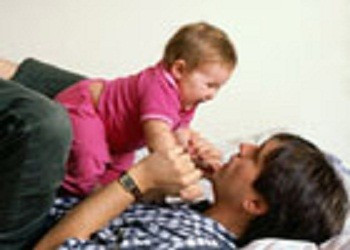Children's Behavioural Problems Traced to Father-Infant Interaction

Infants whose fathers engage regularly with them during their first three months have very few behavioural problems when they reach their first birthday, according to a Wellcome Trust report.
The report, compiled by researchers from the University of Oxford and Imperial College London, also found that a father's influence is more pronounced with boys than girls in the first few weeks after birth.
The researchers conducted a study of 192 children, drawn from two UK maternity units. They studied the level of interaction each child had with their father at three months, and compared it with the child's behaviour after 12 months.
The study found that children with positively engaged fathers displayed markedly fewer behavioural problems than those who had little or no interaction with their dads.
Dr Paul Ramchandani, researcher at the Imperial College London, said: "We found that children whose fathers were more engaged in the interactions had better outcomes, with fewer subsequent behavioural problems. At the other end of the scale, children tended to have greater behavioural problems when their fathers were more remote and lost in their own thoughts, or when their fathers interacted less with them.
"This association tended to be stronger for boys than for girls, suggesting that perhaps boys are more susceptible to the influence of their father from a very early age."
The researchers conclude that the period from birth to three months is crucial for the psychological and physical development of the child - and fathers should be assisted wherever possible.
"As every parent knows, raising a child is not an easy task. Our research adds to a growing body of evidence that suggests that intervening early to help parents can make a positive impact on how their infant develops," Dr Ramchandani said.
© Copyright IBTimes 2025. All rights reserved.



















